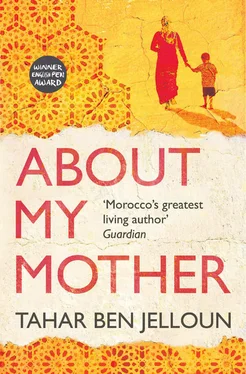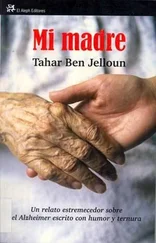My mother’s youngest sister is an energetic woman who enjoys life. She married a man from a wealthy family. That family made a deep impression on us, growing up in Fez. They were the first to buy a motor car, to have a house in the country (where we were invited to stay in the spring), to have a telephone and, most importantly, the first Fassi family to move out of the medina. They were rich people who loved the simple things in life, even though they put on a faintly superior air, to remind us that we didn’t belong to the same class. But they never managed to make my mother feel inferior. Nor my father, who’d criticise their way of life, which made them laugh. My father had a tremendous sense of humour and took great pleasure in his use of irony. My aunt would tease him, and he in turn made fun of her ‘lifestyle’ and her preoccupation with appearances over more fundamental things. People said that his words mixed salt and sugar, honey and pepper, cruelty and raw truth. He wasn’t afraid to say things that were hurtful, but true.
My aunt came to see my mother. She always brought a salutary dose of cheer. She was shocked when Mother took her for someone else, saying: ‘My sweet darling, I’ve been waiting for you such a long time.’ And then she confused her daughter with her mother again. Addressing her sister, she said: ‘You know, darling, my mother’s here — yes, your grandmother — she’s here but she doesn’t recognise me. That’s not nice of her. She came from Fez and all she can think about is when she’s leaving again. I’ve done nothing to hurt her. Speak to her, she’ll listen to you. Ask her why Amina hasn’t come. It’s not like her; she’s always rushed to my bedside. I’m her older sister, I brought her up, along with my daughter, I think they even nursed at the same breast. I was young and healthy. My mother wasn’t strong enough to look after the house and all her children, so she asked me to look after Amina, and I treated her like my own daughter. They’re the same age. Work it out, you’ll see they were born the same year, just six months apart.’
Mother’s sitting on the edge of her bed. Her left foot’s more swollen than her right, the dressing must be a little tight. As usual, she’s wearing a pink tchamir , a kind of long robe, and a white headscarf. Since her hair’s turned white, she’s been covering her head. She’s wearing a gold bracelet. Mother is bored. She looks at the window and says nothing, shifts her position, places her bad foot on the bed and stares at the wardrobe opposite. She calls for Keltum, who doesn’t answer straight away. She calls her again. Keltum shouts: ‘I’m coming.’ ‘Hurry up,’ says my mother. Keltum arrives, looks as if she’s about to shout at her, then says: ‘Only God can put up with her.’ My mother cries: ‘Don’t leave me alone! Why do you shut yourself away on the other side of the house and abandon me? I’m going to tell God in my prayers and you’ll see, my saintly father won’t like it. Come over here, sit down and don’t move!’
Mother and Keltum are bored. They both stare intently at a corner of the room. On TV there’s an American soap opera dubbed into Spanish. The colours are garish. The images fall from the screen and mingle with the dust on the carpet. My mother smiles, she’s all alone. Keltum dozes. The phone rings. Highlight of the day. ‘It’s your son calling.’ ‘Which one?’ ‘The one who phones every day!’
I speak to my mother. When I ask ‘How are you?’ I always get the same response: ‘I’m here, picking up a few crumbs of time until God decides to release me. I’m in His hands. Death is certain; there’s no point talking about it. I’m just waiting!’ I ask Keltum how things are. She owes me the truth; she tells me whether my mother’s slept well, or if she has diarrhoea or has been hallucinating. I speak to my mother again and she complains about Keltum, laughing. When she laughs, it’s a good sign. Then I ask for her prayers and her blessing. She knows them by heart and puts all her energy into them, with no mistakes or hesitation. When she blesses me, my mother is fully there. She raises her eyes to the heavens and addresses God. Just listening to her makes me feel protected. It’s not rational, but I don’t question it. My mother sees me as a fragile creature whose way needs lighting. She’s forever praying that I’ll be kept safe from enemies, from bad, jealous people. She sees them and chases them away with her hand.
For a long time now, my mother has prayed sitting down, with her eyes closed. She murmurs her prayers, wiggles her right index finger and concludes by joining her hands, pointing them upwards and telling God her dearest wishes.
These days she talks of nothing but her jewellery. She says it’s all disappeared. She shared it out among her granddaughters and daughters-in-law a few years ago, saying: ‘I’d rather give you my jewellery now, so there’ll be no arguing after I die, I’m just keeping this bangle and this necklace.’ That was the necklace she’d thrown down the toilet. Keltum thought it was hers by rights. My mother claimed it. Keltum flung it onto the bed, saying: ‘I should have left it in her shit.’ The bangle, impossible to get off her wrist now, was safe.
That necklace is precious. My mother wore it on her wedding night. It was a long night, an interminable night. Adorned with jewellery, she waited, surrounded by negafates — women companions whose job was to ensure the ceremony was conducted properly. The celebrations took place in two houses. The girl’s family waited while the bridegroom’s kinsmen readied themselves to come and take the bride away. Time dragged on. The girl was drowsy, she could hardly keep her eyes open. Tiredness from the hammam and the tension of the day heightened her fear and sharpened her curiosity about the man who was to be her husband for life. Because in those families, divorce did not exist. Marriage was for ever, whether you were happy or not.
The girl waits and counts her years, her months. She recounts several times. Fifteen years and seven months, or sixteen years and a few weeks? She had been told she was five years older than her brother, that her little sister was still a baby: ‘So that makes me fifteen and a half. My periods started five years ago. They told me I was early. I was ten then, so I’m fifteen now …’
She counts so as not to fall asleep. The jewellery lent her by the negafates is heavy, the embroidered caftan is heavy, her make-up is heavy, the air she breathes is heavy. The sound of the festivities is soothing. She is ready. Ready to take the hand of her husband, this stranger, this scion of a prominent family, this man whose face and stature are unknown to her. A husband made for her, chosen by her parents, in a sort of pact between people of the same kind. She waits, wrapped in her ceremonial bridal dress, her seroual tied too tight. She waits, with no idea what to expect. She tries hard to picture this man naked — pure invention, she’s afraid to think beyond that. She’s scared, she’s thirsty, she isn’t hungry, she needs to talk to a married friend and ask her what might happen.
At around three o’clock in the morning, the head negafa arrives, a woman whose bulk, natural authority and expression are intimidating, causing girls to look away immediately: ‘My girl, you know what’s in store for you. It is my duty to initiate you and give you some clear, practical advice. When your husband enters this dakhchoucha, you should rise and walk towards him, looking down — never look up at him — and kiss his right hand. Don’t hold on to it, let it go, return to the bed and sit down. While he takes off his djellaba, his jabador and his seroual, you must wait until he gives you the order to get undressed. In a dark corner of the room, take off your jewellery and then your caftan. Keep on your white tchamir and your seroual, too — it’s up to your husband to remove them. Be careful: no crying out, no tears, this is a crucial moment. A man is going to touch your skin for the first time. Let him have his way, be obedient, gentle and relaxed. Don’t be afraid. He will try to penetrate you — open your legs wide, let your mind go blank. It’s painful at first. Take this cream and hide it under the pillow. If he has trouble entering you, smear it on your lower lips discreetly, to help things along. When he’s inside you, keep him there by wedging your feet under his buttocks. Let him do all the moving. Don’t think of enjoying it this night — forget that, my girl — we need to see blood on your white seroual. If it hurts, don’t cry out. Stifle your cries, yield, endure and, most importantly, prove to each and every one of us that you are a virgin, a daughter from a great family, a girl carrying her family’s honour and bringing a flush of pride to their cheeks. That’s it, my girl. The first time is painful, but afterwards, when the wound eases and the scar heals, you will never let him go.
Читать дальше












